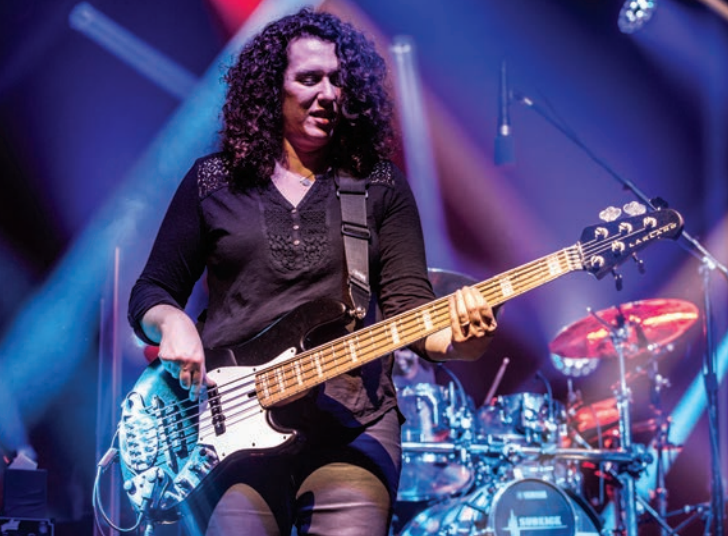The Core: STS9’s Alana Rocklin Explores ‘The Universe Inside’

STS9’s new bassist surveys their first album in eight years— and first since the departure of founding member David Murphy.
ACROSS THE UNIVERSE
The Universe Inside is a concept record; it’s a journey. It’s an effort to try and put this energy that we’re feeling into the world. It’s a personal record. It’s about the universe inside of all of us—how we relate as people, the notion that we’re all made out of stardust. It’s about the journey of life and how up and down that is—this common thread we all have as humans and really trying to reflect that with the music. We’re all made of the same things.
We’ve worked on lots of songs as a group since I joined [in 2014]. Some of them were ideas that had been started before David Murphy left the band, but we developed and changed those ideas together. The thread was really obvious to us from the get-go. We had an intentional energy and vibe before we pared things down to what we really wanted to say. It runs the gamut. Some songs are total funk—a new spin on this Michael Jackson/Quincy Jones energy. Then, there are ideas that are complete collages and snippets—pieces of life. One song’s an improvisation, us creating in the moment. It turned out so cool that we left it on there. It’s meant to be something that you put on and listen to all the way through on this journey. We recorded it mostly in our studio in Santa Cruz with my husband Brad Bowden co-producing and engineering. It was great to just get back to recording together— it was mixed at our studio by Brad and Hunter [Brown].
HIGH FIDELITY
We’ve played a lot of new material since I joined the band—some of which is on the record, most of which is not. We want people to hear the majority of the songs for the first time when they listen to the album. We took our time and re-recorded certain things to make sure they sounded like what we heard in our heads. The fidelity is amazing. But it’s also music that we feel can be played live—music that can be explored. The band’s improvisational aspect is what brought us together when we met in 2001—the notion that you could have these sections and vibes that were based around a dance feel but are improvisations. I see myself as an improviser, first and foremost. That’s where the band is rooted, so a very natural thing happened when I joined. We just started going there.
ALANA’S ORIGIN STORY
I’ve played bass since I was eight and upright bass since I was 10. I ended up pursuing classical studies at the University of Michigan but, a year or so into that, I switched my major to jazz. From there, I made music my career and, right after school, formed a band with my husband. At that time, we were living in Chicago and released a record under the name The All Rectangle—Fareed Haque is on it. Somebody passed it to [STS9 percussionist] Jeffree Lerner, and we opened for Sector 9 during one of their first Chicago shows. That’s where we met. We just fell in love with each other’s music right away. It was one of those moments—you’re younger and you connect with people in this really different way. There was this mutual appreciation from that day forward and we stayed in touch. Brad and I had different incarnations of our band—one with Johnny Neel—and opened for STS9 during their first run at the Tabernacle in Atlanta. I’d moved to Nashville by that time and started playing with Jeff Coffin. Brad was working for Futureman, making drum sounds, but we were always sending music to the STS9 guys. Eventually, they signed our band, sub-ID, to [their label] 1320. Before they asked me to join the band, I had been playing with Jim James in his solo group.
“NEW DAWN, NEW DAY”
Even if you’re good friends, it’s never easy to transition into a band like this, but our friendship made it easier. There’s a natural period where it’s a little uncomfortable. You have to find each other. It’s important to have that phase where you are really feeling each other out. Thankfully, we were able to take time to do that. I’m a fan of the band and have been for a long time. The music means so much to me; the songs are important to me. I wanted to make sure I was doing everything possible to honor what the band had accomplished—what I heard in my head as a fan. I spent time preparing before we came together for a couple months of rehearsal. It was really casual and relaxed. Sometimes we would improvise; sometimes we would just talk. It was important for us to feel good, feel comfortable, before that first show. It just shot o from there, and we were just able to have fun and just let go. “New Dawn, New Day” was the first song that we wrote together. There was a conscious effort to write a song that really reflected what we wanted to put out there and play it at our first show.
IMPROVISE AND IMPROVE
People ask if I [was the reason STS9 has brought back so many songs], but it was a group effort. Everybody had songs they wanted to revisit. When I first came in to rehearse, Zach [Velmer] brought out “Poseidon.” “Potamus” was a song I loved and asked to play. Since I’ve been in the band, everybody has had different songs that they wanted to revisit or even just improve on. There are songs that people probably don’t think of as “bustouts” that we’ve revamped and worked on. We’ve tried to take the time to do that for a while—we have a whole list of them that we still haven’t gotten to.



















